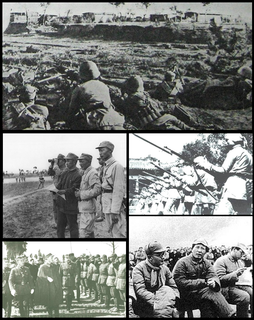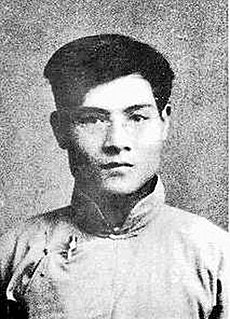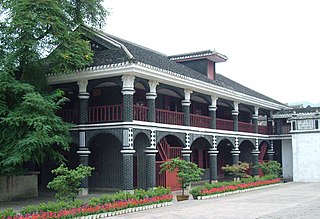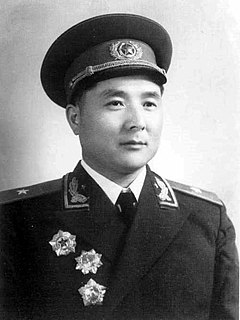
The Chinese Civil War was a civil war in China fought between the Kuomintang (KMT)-led government of the Republic of China (ROC) and forces of the Chinese Communist Party (CCP) lasting intermittently between 1927 and 1949.

The Long March was a military retreat undertaken by the Red Army of the Chinese Communist Party (CCP), the forerunner of the People's Liberation Army, to evade the pursuit of the Kuomintang army. Strictly speaking, the Long March was a series of marches, as various Communist armies in the south escaped to the north and west. However, the most famous began in the Jiangxi province in October 1934 and ended in the Shaanxi province in October 1935. The First Front Army of the Chinese Soviet Republic, led by an inexperienced military commission, was on the brink of annihilation by Generalissimo Chiang Kai-shek's troops in their stronghold in Jiangxi province. The CCP, under the eventual command of Mao Zedong and Zhou Enlai, escaped in a circling retreat to the west and north, which reportedly traversed over 9,000 kilometres (5,600 mi) over 370 days. The route passed through some of the most difficult terrain of western China by traveling west, then north, to Shaanxi.

The Republic of China Military Academy is the service academy for the army of the Republic of China, located in Fengshan District, Kaohsiung. Previously known as the Whampoa Military Academy, the military academy produced commanders who fought in many of China's conflicts in the 20th century, notably the Northern Expedition, the Second Sino-Japanese War and the Chinese Civil War.

Zhang Guotao, or Chang Kuo-tao, was a founding member of the Chinese Communist Party (CCP) and rival to Mao Zedong. During the 1920s he studied in the Soviet Union and became a key contact with the Comintern, organizing the CCP labor movement in the United Front with the Kuomintang. In 1931, after the Party had been driven from the cities, he established the E-Yu-Wan Soviet. When his armies were driven from the region, he joined the Long March but lost a contentious struggle for party leadership to Mao Zedong. Zhang's armies then took a different route from Mao's and were badly beaten by local forces in Gansu. When his depleted forces finally arrived to join Mao in Yan'an, Zhang continued his losing challenge to Mao, and left the party in 1938. Zhang eventually retired to Canada, in 1968. He became a Christian shortly before his death in Toronto, Ontario in 1979. His memoirs provide valuable and vivid information on his life and party history.

The Zunyi Conference was a meeting of the Communist Party of China (CPC) in January 1935 during the Long March. This meeting involved a power struggle between the leadership of Bo Gu and Otto Braun and the opposition led by Mao Zedong. The result was that Mao left the meeting in position to take over military command and become the leader of the Communist Party. The conference was completely unacknowledged until the 1950s and still no detailed descriptions were available until the fiftieth anniversary in 1985.

Xi Zhongxun was a Chinese communist revolutionary and a subsequent political official in the People's Republic of China. He is considered to be among the first and second generation of Chinese leadership. The contributions he made to the Chinese communist revolution and the development of the People's Republic, from the founding of Communist guerrilla bases in northwestern China in the 1930s to initiation of economic liberalization in southern China in the 1980s, are numerous and broad. He was known for political moderation and for the setbacks he endured in his career. He was imprisoned and purged several times. Xi was also the father of Xi Jinping, the current Chinese leader and General Secretary of the Communist Party.

He Yingqin, also Ho Ying-chin, was a politician and one of the most senior generals of the Kuomintang (KMT) during Republic of China, and a close ally of Chiang Kai-shek.

The Shanghai massacre of 12 April 1927, the April 12 Purge or the April 12 Incident as it is commonly known in China, was the violent suppression of Chinese Communist Party (CCP) organizations and leftist elements in Shanghai by forces supporting General Chiang Kai-shek and conservative factions in the Kuomintang. Following the incident, conservative KMT elements carried out a full-scale purge of Communists in all areas under their control, and violent suppression occurred in Guangzhou and Changsha. The purge led to an open split between left and right wing factions in the KMT, with Chiang Kai-shek establishing himself as the leader of the right wing faction based in Nanjing, in opposition to the original left-wing KMT government based in Wuhan led by Wang Jingwei.
The Campaign in the Eastern Foothills of the Funiu Mountains (伏牛山东麓战役) was a series of battles fought between the nationalists and the communists during the Chinese Civil War after World War II for the control of western Hubei and the border areas of Hubei, Honan and Shensi provinces. The campaign resulted in the communist victory.

Guan Linzheng was a highly successful Chinese general in the Kuomintang who fought against both the Communists and the Imperial Japanese Army, and was a recipient of Order of Blue Sky and White Sun, the highest honor for a Chinese Nationalist commander.

The conquest of Wu by Jin was a military campaign launched by the Jin dynasty (266–420) against the state of Eastern Wu in 280 at the end of the Three Kingdoms period (220–280) of China. The campaign concluded with the fall of Wu and the reunification of China under the Jin dynasty.

Liu Yalou was a general in the Chinese People's Liberation Army who served as the inaugural commander-in-chief of the PLA Air Force During the Chinese Civil War, he was chief of staff of Lin Biao's army group, which occupied the entire Manchuria in 1948 and captured 472,000 Kuomintang troops in the Liaoshen Campaign.

Wang Hai was a Chinese fighter pilot and general. A flying ace of the Korean War, he served as commander of the People's Liberation Army Air Force (PLAAF) from 1985 to 1992. He was awarded the rank of general in 1988.

Zhang Lingfu was a high-ranking general of the Chinese National Revolutionary Army. He successfully fought against the Communists and the Imperial Japanese Army. In 1947, his unit was surrounded by Chinese communist forces commanded by Field Marshal Chen Yi and General Su Yu. Zhang was unable to breakout from the communist encirclement because the relief efforts headed by his nationalist colleagues did not arrive on time, and he was killed in action in the Menglianggu Campaign on May 16, 1947.

Ren Bishi was a military and political leader in the early Chinese Communist Party.

Xiao Jinguang was a revolutionary and military leader, one of the main leaders of the Red Army and the People's Liberation Army, and one of the ten senior general officers of the PLA.

Xiang Shouzhi was a Chinese general and revolutionist. He was promoted to the rank of major general in 1955 and general in 1988. He was a member of the 11th National Congress of the Communist Party of China and the 12th CPC Central Committee.
Fang Huai was a major general of the Chinese People's Liberation Army.
Wei Jinshan is a Chinese Communist revolutionary and retired vice admiral of the Chinese People's Liberation Army Navy (PLAN). Starting in 1945, he served for decades in the army under General Xu Shiyou, and became a decorated veteran of the Second Sino-Japanese War, the Chinese Civil War, and the Korean War. He later transferred to the Navy and served as Political Commissar of the PLAN from 1990 to 1993. He was awarded the Medal of Honour by President Xi Jinping and the Order of the National Flag by North Korea.

Chen Jia-Shang was a Colonel general of the Republic of China Air Force and the Third Commander in Chief of the ROCAF whose term spanned July 1, 1957 to July 1, 1963. He was born in Hangzhou in the Zhejiang Province in March 1909.

















